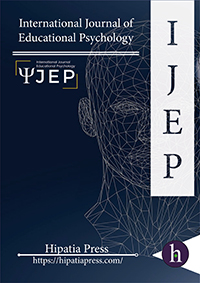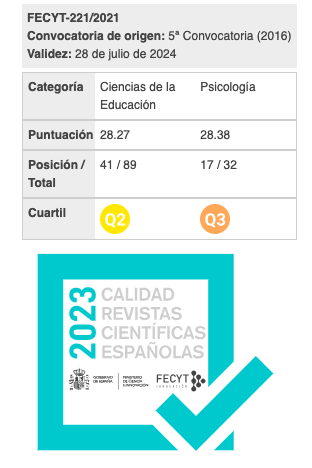Encyclopedic Memory: Long-Term Memory Capacity for Knowledge Vocabulary in Middle School
Keywords:
Downloads
Abstract
This article is a synthesis of unpublished and published experiments showing that elementary memory scores (words and pictures immediate recall; delayed recall, recognition), which are very sensitive to aging and in pharmacological protocols, have little or no correlation with school achievement. The alternative assumption developed is that school achievement strongly depends on the long-term memory of scholastic knowledge (history, literature, sciences, maths, etc), called encyclopedic memory.
A longitudinal study from the grade 6 to the grade 9 of a cohort of eight classes of a French college, was undertaken in order to observe the implication of the encyclopedic vocabulary (i.e. Julius Caesar, Manhattan, Shangaï, Uranus, vector) in school performance. An inventory in the school textbooks gives approximately 6000 encyclopedic words in grade 6, to 24000 in grade 9. The encyclopedic storage capacity was estimated at the end of each year by a multiple-choice questionnaire with random samples of words (800 items; 8 subject subjects). The results show an estimation of 2500 words acquired at the end of grade 6, to 17000 at the end of the grade 9. The correlations are from .61 to .72 between the score of encyclopedic memory and the average school grades.
Downloads
References
Acuña, S.R., Rodicio, H.G., & Sánchez, E. (2011). Fostering active processing of instructional explanations of learners with high and prior knowlege. European Journal of Psychology of Education, 26(4), 435-452.
Google Scholar CrossrefAllain, H., Lieury, A., & Gandon, J. M. (1993). Psychopharmacology of memory processes. In I. Hindmarch & P.D. Stonier, (Eds), Human psychopharmacology (pp.143-164). Chichester : J. Wiley, & Sons.
Google Scholar CrossrefAubret, F. (1987). Pronostic de la scolarité en second cycle secondaire. Validité prédictive de certains tests collectifs et d'appréciation scolaires en classe de 3e. L'Orientation scolaire et professionnelle, 16, 151-158.
Google Scholar CrossrefBahrick, H. (1984). Semantic memory content in permastore: 50 years of memory for Spanish learned in school. Journal of Experimental Psychology: General, 113, 1-29.
Google Scholar CrossrefBrown, G. D. (2008). Mathematics vocabulary instruction for current non-proficient students with and without ieps: A study of three methods of instruction. Dissertation Abstracts International: 69(1-A), 176-176.
Google Scholar CrossrefCain, K, Oakhill, J., & Lemmon, K. (2004). Individual Differences in the Inference of Word Meanings From Context: The Influence of Reading Comprehension, Vocabulary Knowledge, and Memory Capacity. Journal of Educational Psychology, 96(4), 671-681.
Google Scholar CrossrefCamba R., & Morra S. (2009). L'apprendimento di vocaboli in età scolare. Giornale Italiano di Psicologia, 36(1), 229-239.
Google Scholar CrossrefConway, M., Cohen, G., & Stanhope, N. (1992). Very long term memory for knowledge acquired at school and university. Applied cognitive psychology, 6, 467-482.
Google Scholar CrossrefCusters, E.J.F.M. (2011). Very long‐term retention of basic science knowledge in doctors after graduation. Medical Education, 45(4), 422-430.
Google Scholar CrossrefDehaene, S. (2003). La bosse des maths (1ère édition, 1997). Paris: Odile Jacob poches.
Google Scholar CrossrefDéro, M., Fenouillet, F., & Lieury, A. (2012). Estimation du vocabulaire encyclopédique mémorisé à l’école élémentaire. (submitted).
Google Scholar CrossrefDottrens, R., & Massarenti, D. (1963). Vocabulaire fondamental du français. Cahiers de pédagogie expérimentale et de psychologie de l'enfant. Neuchâtel : Delachaux et Niestlé.
Google Scholar CrossrefEhrlich, S., Bramaud du Boucheron, G., & Florin, A. (1978). Le développement des connaissances lexicales à l'école primaire. Poitiers : PUF/Laboratoire de Psychologie de Poitiers.
Google Scholar CrossrefFlorin, A. (1993). Pour une didactique des activités lexicales à l'école. Repères, 8, 93-112.
Google Scholar CrossrefGathers, A. D, Bhatt, R., Corbly, C. R., Farley, A. B., & Joseph, J. E. (2004). Developmental shifts in cortical loci for face and object recognition. NeuroReport: For Rapid Communication of Neuroscience Research, 15(10), 1549-1553.
Google Scholar CrossrefGuo, J.P, & Pang M.F. (2011). Learning a mathematical concept from comparing examples: the importance of variation and prior knowledge. European Journal of Psychology of Education, 26, 495-525.
Google Scholar CrossrefHepburn, E. (2010). Vocabulary acquisition in young children: The role of the story. Journal of Early Childhood Literacy, 10(2), 159-182.
Google Scholar CrossrefJoseph, J. E. (2002). Natural and manufactured objects activate the fusiform face area. Neuroreport, 13(7), 935-936.
Google Scholar CrossrefKidd, E., & Kirjavainen, M. (2011). Investigating the contribution of procedural and declarative memory to the acquisition of past tense morphology: Evidence from Finnish. Language and Cognitive Processes, 26(4-6), 794-829.
Google Scholar CrossrefKyttälä, M., & Lehto, J. (2008). Some factors underlying mathematical performance: the role of visuospatial working memory and non-verbal intelligence. European Journal of Psychology of Education, 23(1), 77-94.
Google Scholar CrossrefLarson, G. E., & Saccuzzo D. P. (1989). Cognitive correlates of general intelligence: Toward a process theory of g. Intelligence, 13, 5-31.
Google Scholar CrossrefLee, J. (2011). Size matters: Early vocabulary as a predictor of language and literacy competence. Applied Psycholinguistics, 32(1), 69-92.
Google Scholar CrossrefLété, B. (2004). MANULEX : Le lexique des manuels scolaires de lecture. Implications pour l’estimation du vocabulaire des enfants de 6 à 11 ans. In E. Calaque & J. David (Eds), Didactique du lexique : Contextes, démarches, supports (pp.241-257). Bruxelles: De Boeck.
Google Scholar CrossrefLété, B., Sprenger-Charolles, L. & Colé, P. (2004). MANULEX : A grade-level lexical database from French elementary school readers, Behavior Research Methods, Instruments, & Computers, 36(1), 156-166.
Google Scholar CrossrefLieury, A. (1996). Mémoire encyclopédique et devenir scolaire : Etude longitudinale d’une cohorte sur les quatre années du collège français. Psychologie et Psychométrie, 17(3), 33-44.
Google Scholar CrossrefLieury, A. (2012). Mémoire et Réussite scolaire (4e édition). Paris: Dunod (1st edition 1991).
Google Scholar CrossrefLieury, A. & Calvez, F. (1986). Le double codage des dessins en fonction du temps de présentation et de l’ambiguïté, L’Année psychologique, 86, 45-61.
Google Scholar CrossrefLieury, A., Trebon, P., Boujon, Ch., Bernoussi, M., & Allain, H. (1991). Le vieillissement de la mémoire : Analyse factorielle de 17 scores de mémoire. L'Année Psychologique, 91, 169-186.
Google Scholar CrossrefLieury, A., Van Acker, P., Clevede, M., & Durand, P. (1992). Les Facteurs de la réussite scolaire : Raisonnement ou Mémoire sémantique ? Psychologie et Psychométrie, 13, 33-46.
Google Scholar CrossrefLieury, A., Van Acker, P., Clevede, M., & Durand, P. (1995a). Mémoire encyclopédique et Réussite en 4e de collège. Psychologie et Psychométrie, 16, 25-48.
Google Scholar CrossrefLieury, A., Van Acker, P., & Durand, P. (1995b). Mémoire encyclopédique et réussite en 3e et au Brevet des collèges. Psychologie et Psychométrie, 16(3), 35-59.
Google Scholar CrossrefMacedonia, M. (2010). Neural correlates of high performance in foreign language vocabulary learning. Mind, Brain and Education, 4(3), 125-134.
Google Scholar CrossrefMarulis, L. M. (2010). The effects of vocabulary intervention on young children’s word learning: A meta-analysis. Review of Educational Research, 80(3), 300-335.
Google Scholar CrossrefMasoura, E.V., & Gathercole, S. E. (2005). Contrasting contributions of phonological short-term memory and long-term knowledge to vocabulary learning in a foreign language. Memory, 13(3-4), 422-429.
Google Scholar CrossrefNagy, W. E., & Anderson, R. C. (1984). How many words are there in printed school English?. Reading Research Quaterly, 19, 304-330.
Google Scholar CrossrefNagy, W. E., & Herman, P. A. (1987). Breadth and depth of vocabulary knowledge. : Implications for acquisition and instruction. In M. G. McKoewn & M. E. Curtis (Eds), The nature of vocabulary acquisition (pp.19-35). Hillsdale, New Jersey: Lawrence Erlbaum associates.
Google Scholar CrossrefN'Guyen Xuan, A. (1969). Etude par le modèle factoriel d'une hypothèse sur les processus de développement : recherche expérimentale sur quelques aptitudes intellectuelles chez des élèves du premier cycle de l'enseignement secondaire. Paris: Laboratoire de Psychologie Différentielle.
Google Scholar CrossrefPaivio, A., & Csapo, K. (1969). Concrete Image and Verbal Memory Codes. Journal of Experimental Psychology, 80, 279-285.
Google Scholar CrossrefPichot, P., & Rennes, P. (1949). Le pronostic de la réussite scolaire : valeur respective d’un test de facteur « G » et d’un test de vocabulaire. Enfance, 2, 364-365.
Google Scholar CrossrefRichardson, F., Thomas, M. S., Filippi, R., Harth, H., & Price, C. J. (2010). Contrasting effects of vocabulary knowledge on temporal and parietal brain structure across lifespan. Journal of Cognitive Neuroscience, 22(5), 943-954.
Google Scholar CrossrefRosenthal, J., & Ehri, L.C. (2011). Pronouncing new words aloud during the silent reading of text enhances fifth graders' memory for vocabulary words and their spellings. Reading and Writing, 24(8), 921-950.
Google Scholar CrossrefSternberg, R. J. (1987). Most vocabulary is learned from context. In M. G. McKoewn & M. E. Curtis (Eds), The nature of vocabulary acquisition (pp.89-105). Hillsdale, New Jersey: Erlbaum.
Google Scholar CrossrefVan Acker, P., Vrignaud, P., & Lieury, A. : Mémoire de travail, Mémoire encyclopédique et performance scolaire en 3e. L’Orientation scolaire et professionnelle, 26(4), 571-596.
Google Scholar CrossrefVerhoeven, L. (2011). Vocabulary growth and reading development across the elementary school years. Scientific Studies of Reading, 15(1), 8-25.
Google Scholar CrossrefDownloads
Published
Almetric
Dimensions
How to Cite
Issue
Section
License
All articles are published under Creative Commons copyright (CC BY). Authors hold the copyright and retain publishing rights without restrictions, but authors allow anyone to download, reuse, reprint, modify, distribute, and/or copy articles as the original source is cited.
















